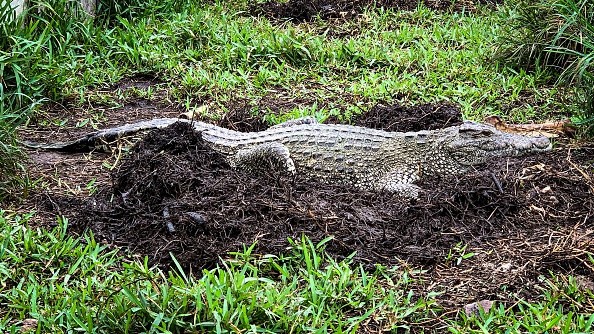A love towards her children. It is a mother's parental love that the three-legged alligator mom expresses to her babies. The alligator provides a nest for protection and helps them to the water's edge.
According to Newsweek's report, Owen Lauer uploaded the video on social media that became an instant hit with social media netizens were amazed by the love of the alligator.
The footage showed the alligator limping to the nest and accompanying her babies. It happened in Florida.
Lauer posted on Facebook that the alligator mom created the big nest for her children with sticks and twigs. He added that the three-legged alligator was guarding the babies with her life.
In an interview with Newsweek, Coleman M. Sheehy, a herpetologist at the Florida Museum of Natural History, said that the mother alligator might feel what humans think as love towards her babies.
Moreover, the herpetologist said that emotions, including love, are caused by hormones. It is part of the endocrine system, which the alligator has. Being said, the alligator would feel love for her children.
Parental care

Newsweek reported that parental care is seen as well-developed in alligators. Coleman said that alligator mothers could do the following:
- Builds nest.
- Guards nest from predators.
- Help the nest reach an acceptable temperature for her babies.
As Coleman added, what is impressive is that babies produce a distinctive vocalization when the eggs hatch or are about to hatch. It stimulates the mother alligator to dig to uncover the eggs.
However, it doesn't end there because the alligator's mom expresses more parental love. The mother transfers her babies on her mount to safe spots or areas where they could practice hunting. Alligator remains with them for two years, assuring that the babies can survive
In an interview with Newsweek, an expert Cathy M. Bondinof Jachowski, said that the benefits of providing parental care among mother alligators increase the chances that some of the offspring can survive and make it to adulthood against predators.
Jachowski added that the mother alligator passes genetic information to her future offspring. Jachowski is an assistant professor at the Department of Forestry & Environmental Conservation, Clemson University.
Moreover, the instinct of a mother crocodile shows when there is danger. She can keep her babies in her mouth, closing her jaws so babies won't get harmed by her sharp teeth.
Other mother species
Newsweek reported that other reptiles do not have the same parent care as alligators when their eggs hatch. Caring for babies requires more of their energy and strength.
However, having without parental care could lead to more concern because babies are vulnerable to predators, natural death, and chances of survival are low.
Coleman said that the close ancestry of crocodiles came with the birds and dinosaurs. They belong to the archosaurs group, showing loving behaviors, including protection, parental care, and habitat or nest building.
For more similar, don't forget to follow Nature World News
© 2025 NatureWorldNews.com All rights reserved. Do not reproduce without permission.





